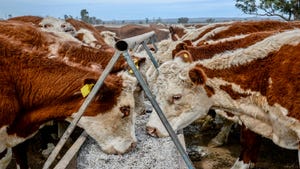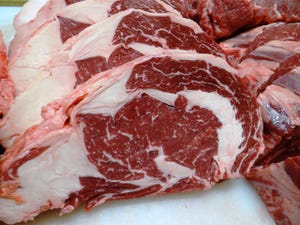U.S. Animal Expert Calls Europe's E. coli Outbreak "Off the Charts", Says American Consumers Shouldn't Worry
With 18 dead and 1,600 ill in Europe from an outbreak of what's being called a "super-toxic" strain of E. coli bacteria, an Iowa State University professor who specializes in food-borne pathogens in livestock is stunned at the toll the rogue bacteria has taken
June 3, 2011

With 18 dead and 1,600 ill in Europe from an outbreak of what's being called a "super-toxic" strain of E. coli bacteria, an Iowa State University professor who specializes in food-borne pathogens in livestock is stunned at the toll the rogue bacteria has taken.
"I don't like to be alarmist, but this one's off the charts," said Dr. Scott Hurd, associate professor of Veterinary Diagnostic and Production Animal Medicine. "I'm shocked and saddened by the deaths and serious illnesses that have resulted from this poisonous strain that frankly is surprising everyone."
Hurd said the most notable E. coli outbreak in the U.S. occurred in the early '90s when four children died and hundreds of others became sick in western states after eating undercooked and contaminated meat from Jack in the Box restaurants. The European outbreak is remarkable in comparison, said Hurd, who believes this is a rare strain rather than new as some scientists believe.
E. coli naturally exists in the gastrointestinal tracts of animals and humans, said Hurd, but sometimes a select few strains have the ability to produce a poison that can result in illness, damage to the kidneys, and even death.
Raw tomatoes, cucumbers, and lettuce have been identified as possible E. coli bacteria carriers in Europe, with manure suspected as the source. Hurd said researchers still don't know what the "food vehicle" is yet, so there's no way to be sure the origin is manure, but noted that E. coli can often be traced back to "warm-blooded animals, whether that be cattle, deer or humans."
Though bacteria like E. coli can travel quickly around the globe, no produce in the U.S. has been contaminated with the European strain, according to the Centers for Disease Control and Prevention. U.S. consumers shouldn't be concerned about this strain impacting the nations' produce, said Hurd, but should always be conscientious about practicing food safety.
"If you cook fruits and vegetables, you don't have to worry," said Hurd. "But most consumers eat them raw so wash them thoroughly, particularly leafy lettuce. Commercial produce rinses are an option. And be aware that organic produce often is fertilized with livestock manure."
The Centers for Disease Control and Prevention has confirmed that three Americans recently returning from trips to Germany have tested positive for the toxic E. coli strain and have developed kidney complications. However, according to the CDC, the bacteria are rarely passed from person to person.
"This is 18 deaths in a world of six billion people," said Hurd, noting that while the European outbreak is tragic and significant compared to other E. coli outbreaks, U.S. consumers should not be concerned. "Consider, too, the possibility that this same thing may have happened 20 or 30 years ago but no one had the technology to connect the dots. While it seems new and scary, it may have been happening all along."
Hurd is a contributor to the Center for Food Integrity's Best Food Facts, which provides "objective answers to common questions about the U.S. food system."
You May Also Like



